Choosing a career is one of those pivotal decisions that decide the course of your life.
Such a crucial decision deserves considerable time and introspection. We have attempted to throw light on a scientific approach to career choices which is validated by researched theories.
Points to be aware of before deciding your steps to career.
Before we see the right way to choose a career, let us look at what you should not do.
- Following Family Path – You as an individual have different qualities and aptitudes than your parents. It is important to not pick a career just because of your family history. Finding success in the same field as your parents did is not mandatory.
- Peer Pressure – Falling for pressure on what others does in similar situations can be a big hurdle in deciding the right career path. While your friends and family push you towards a particular career, it is important to know your passion and potential before deciding.
- Ignorance – One should never overlook the value of an expert opinion. While it is good to trust your friends, families, and teachers’ advice, career counselors are the right people for the job. It is sad that only 1 in 10 students receive professional career counseling in India.
- Limited understanding of Future Professions – Although there are more than 200 different career options, 90% of Indian students are aware of just eight to ten career options such as law, engineering, medicine, accounts, finance, design, computer applications/ IT, law, and management.
- Misleading Salary and Stats – Just because someone got success in a certain field or most persons are pursuing a certain stream, it is not necessary that you should also follow the trend. Today, there is a vast opportunity in various fields which are more futuristic. It is important you decide your career path based on your strengths and not stats and numbers.
5 Types of Scientific Method
Psychometric tests
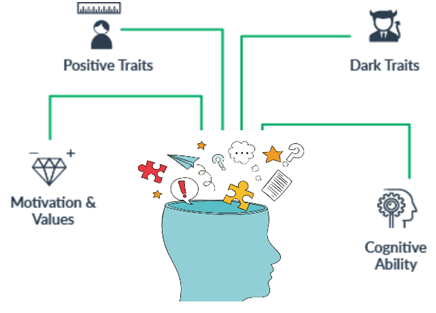
Psychometric tests reveal the personality and behavior of a person. Personality is ‘what we are’ while the behavior is ‘what we do.’ Apart from that, the term ‘psychometric’ often refers to tests that measure a person’s understanding of formulae, theories, and concepts. So overall, these assessments measure the intelligence, intended behavior, skills, and competencies of a person.
The most important parameters that are covered in a Psychometric test are the Outer & Inner Personality, Upbringing, Motivation, and Values of a person which reveal the Positive and Negative traits, Drive, or motivation along with their Cognitive ability.
The Positive side: Openness, Positivity, Passion, Proactivity, Enthusiasm, Diligence, and Emotional stability.
The Negative side: Dishonesty, Manipulation, Selfishness, Poor anger management, or handling of criticism.
Although Psychometric tests may be more helpful in situations other than figuring out the perfect job role, they can still indicate the selection of the right career based on the tendencies, likes, and Dislikes of an Individual.
Aptitude Test

Aptitude tests are very similar to psychometric assessments but they are helpful to measure a person’s cognitive prowess and mental potential. The term ‘aptitude’ refers to tests that evaluate a person’s characteristics, intellect, and potential for understanding new theories, concepts, and a range of skills including language comprehension, logical thinking, and numerical ability. Aptitude is defined as an innate, learned, or acquired ability of an individual to perform certain tasks.
Results of Aptitude tests provide analysis of a person’s Numerical reasoning, verbal reasoning, abstract reasoning, spatial reasoning, logical and critical reasoning, speed, accuracy, and other such abilities such as problem-solving and decision making which in their entirety gives an indication of the Right career selection.
Trait-Factor Theory
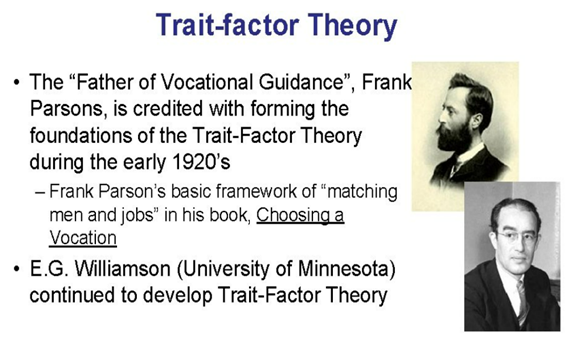
The Trait-Factor theory of career development goes as far back as the early 1900s as advised by vocational theorists Frank Parsons and E.G. Williamson. Career and guidance counselors use trait and factor theory to assist an individual in selecting a vocation. Several different trait and factor theories exist, but all share one basic principle, the use of personal traits to match an individual with an occupation.
Every person has a unique pattern of traits made up of their interests, values, abilities, and personality characteristics. Every occupation is made up of factors required for the successful performance of that occupation. The Trait-Factor Theory process relies upon identifying a fit or match between individual traits and job factors using a straightforward problem-solving/decision-making test supported by effective vocational counseling.The closer the match between personal traits and job factors the greater the likelihood of successful job performance and satisfaction.
Holland’s Career Typology Theory
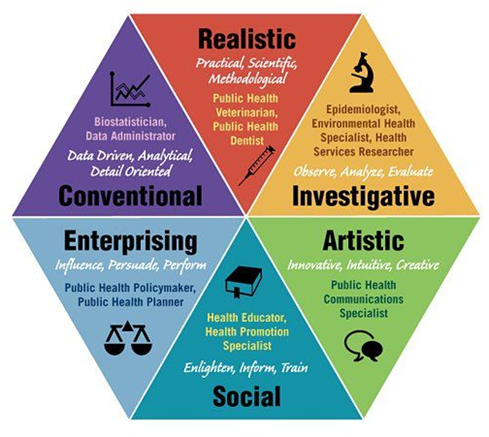
A derivative of the Trait-factor theory can be seen in the work of John Holland a psychologist Ph.D., professor emeritus at Johns Hopkins University. Like the trait-factor approach, Holland’s Career Typology focuses on individual characteristics and occupational tasks. Holland’s theory explains that personalities fall into six broad categories: Realistic, Investigative, Artistic, Social, Enterprising, and Conventional (often referred to as RIASEC).
Although everyone is made up of all six types, one type is usually dominant. Most personalities tend to resemble up to three of the six personality factors. Personalities can be matched with similar combinations of work environments using a problem-solving approach. The closer the match of personality to the job, the greater the satisfaction. Holland’s Career Typology takes a cognitive, problem-solving approach to career planning and this model has been extremely influential in vocational counseling.
Brainography
The ‘Brainography Test’ is by far the most scientific and accurate method to understand a person’s brain. It is a 50-page report starting from age 1 up to retirement age, on how the brain of a person will function for his/her entire life.
A Brainography report can not only precisely specify your most favorable stream after 10 Grades, but also recommends specialization for Post-graduation and Master’s programs. It will guide you with a customized roadmap and help you to live your life to the fullest and make the most out of it. The accuracy level is almost up to 95% with incredible consistency when compared to any Psychometric or Aptitude test, which may give good results but the accuracy cannot be guaranteed
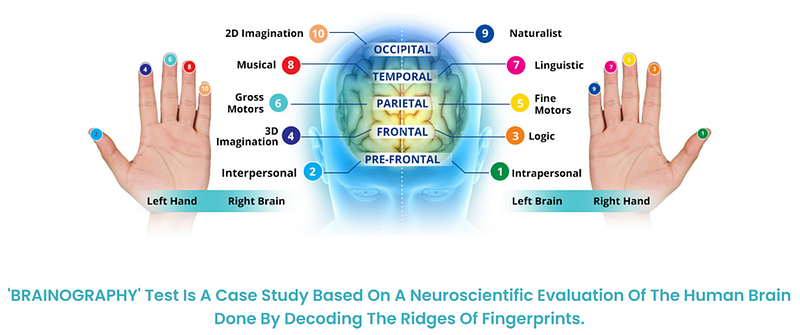

METHOD
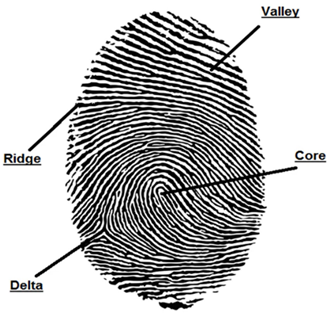
All 10 fingerprints are scanned and the information on the density of ridges is decoded via software. The data of fingerprint patterns and the TRC (Total Ridge Count)provide inputs for an in-depth analysis to decode the strength and limitation of the brain zone. By permutations & combinations of all the Fingerprints respective to the brain lobes,the entire brain is decoded. Although this may sound hypothetical, this is so astonishingly true. Fundamentally this report helps to map the character of a person with pinpoint accuracy. It will precisely reveal the Outer & Inner personality of a person. Also, it will indicate a few health symptoms and diseases likely to occur due to their thought pattern.
Significance of Brainography at Different Phases of Life
KIDS

“Prepare The Child for The Path,
Not the Path for The Child”
- Discover their inborn skills & talents.
- Distinguish their Learning Styles & Methods.
- Prepare for the appropriate stream after Grade X.
- Help them to Build self-confidence
& Healthy Self-Image in early days.
YOUTH

“Life Is Not About Luckily Getting It Right on TheGut,
Even the Experts Need a Bit of Expert Advice.
- Understand Natural Strengths & Boost Confidence.
- Select educational stream & specialization.
- Road Map toward graduation & occupation.
- Learn to conquer Depression, Stress & Anxiety.
ENTREPRENEURS
CORPORATES & EMPLOYEES

” Accept Your Shortcomings & Utilize Your Strength to Overcome Your Limitations.”
- Know your forte and the job you are better suited for.
- Map the level of your IQ, EQ, AQ, & CQ with accuracy.
- Precisely evaluate your Mental & Cognitive Ability.
- Test your Numerical, Verbal & Inductive reasoning.
- Analyze your Problem-solving & Decision-making ability.
- Manage stress & learn to deal with challenges.
